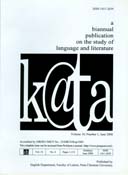The Comparable Nuance of Complicity and Resistance in the Development of Postcolonial Theories
Abstract
This article will explain the issues of complicity and resistance following the significant theories on postcolonial studies. The discussion involves the postcolonial theories developed by Aime Cesaire, Edward Said, Gayatri Spivak, and Homi Bhabha. Overall, there is a comparable nuance on complicity and resistance in postcolonial theories. Complicity on power domination is seen as manipulative by Cesaire and Said. However, Spivak and Bhabha perceive that being compliant to power domination is unavoidable as knowledge has been tainted by the interest of the power controller. In scrutinizing resistance, Cesaire and Said expose the clear violence of colonialism and attack colonial discourse by uncovering the unjustifiable representations. Meanwhile, Spivak and Bhabha argue that the resistance is subtly done without neglecting the tainted knowledge and cultural difference, thus, more negotiable cultural resistances are offered. To consolidate the discussion, a reading of Achebe’s short story entitled “Chike’s School Days†is included in this article.
Downloads
References
Bhabha, H.K. (1994). The Location of Culture. London: Routledge.
CeÌsaire, A., & Kelley, R. D. G. (2000). Discourse on colonialism. New York: Monthly Review Press.
Eide, Elisabeth. Lexical article in Wiley-Blackwell's Encyclopedia of Gender and Sexuality Studies. Strategic Essentialism. Retrieved from (Academia.edu https://www.academia.edu/26133369/Strategic_Essentialism) (Accessed on 29 March 2019)
Gandhi, L. (1998). Postcolonial theory: A critical introduction. New York: Columbia University Press.
https://blogs.baruch.cuny.edu/eng2850kmaspring2017/files/2017/01/Achebe-Chikes-School-Days.pdf. (Accessed 9 April 2019)
Loomba, A. (2005). Colonialism/postcolonialism. London: Routledge.
Lowe, L. (1991). Orient as Woman, Orientalism as Sentimentalism: Flaubert. In Critical Terrains: French and British Orientalisms (pp. 75-101). Ithaca; London: Cornell University Press. Retrieved from http://www.jstor.org/stable/10.7591/j.ctt207g5rk.6 (Accessed on 29 March 2019)
Memmi, A. (2003). The colonizer and the colonized. London: Earthscan.
Said, E.W. (1979). Orientalism. New York: Pantheon Books.
Spivak, G.C. (1988). Can the Subaltern Speak? Basingstoke: Macmillan.

This work is licensed under a Creative Commons Attribution 4.0 International License.
![]() This work is licensed under a Creative Commons Attribution License
This work is licensed under a Creative Commons Attribution License




.png)
.png)

.png)












